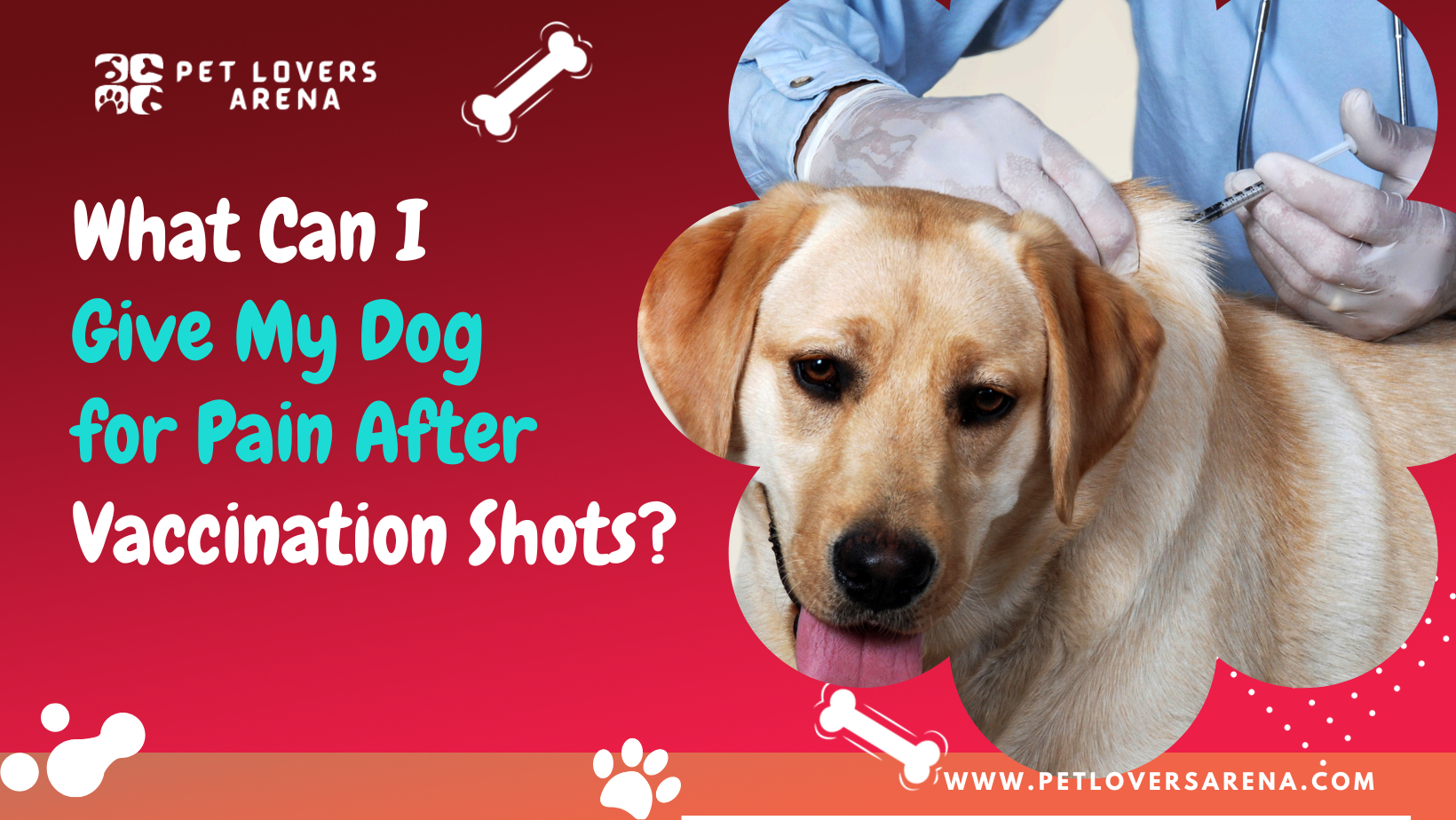As pet parents, we always want the best for our dogs, and keeping a check on their health is equally important. A part of the dog’s good health comes from a timely vaccination slot in which the dog has to undergo a vaccination process every year.
Although pain after shots is normal, it doesn’t help us to stop worrying about the pet and decide the methods by which the dog’s pain may be reduced. This article deals with all these things and will help you to know what things you can do to help your dog overcome the pain after vaccination and much more.
Read the article to get your head clear of all your doubts related to this pain after vaccination in your dog.
Do Dogs Get Hurt After Shots?
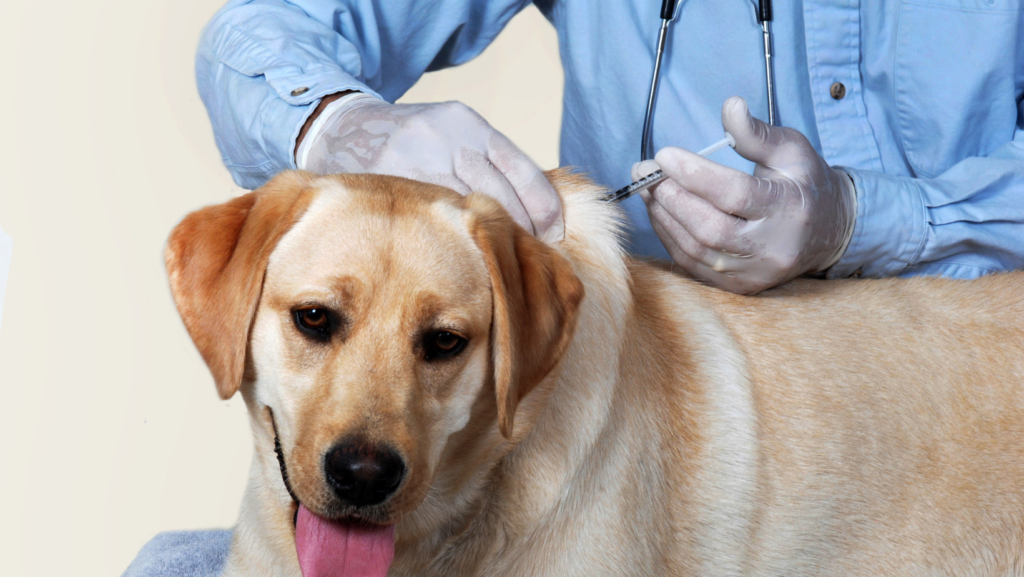
Yes, after getting their shots, dogs get hurt. After getting a vaccination shot, most dogs do not face much difficulty, but some dogs experience extreme pain. Now, as a pet owner, what can you do to help your dog with the pain after vaccination? The last thing any pet owner wants to experience is seeing their pet dog suffering from pain after surgery or vaccination without them being able to do anything.
It would be best if you remembered that for vaccination, a sharp needle gets pushed inside the dog’s skin at the injection site, so it is obvious for the pain to occur in dogs.
For the medicine to be administered to the dog’s body, an injection is inserted through the dog’s skin, and it causes pain. You can also see some allergic reactions, pain, and other reactions within a few hours or seconds of vaccination.
What Reactions Do Dogs Exhibit Following a Vaccination Shot?
The dog may show several kinds of reactions following a vaccination shot. Here are some that you should be familiar with.
Allergic reactions
Itching, hives, persistent vomiting, difficulty in breathing, and a swollen face are some of the allergic reactions that you can see in your dog after the dog recently received a vaccination. These symptoms are a sign of a severe potential or allergic reaction your dog is facing as a side effect of getting a vaccination shot.
These allergic reactions can start mildly but can turn fatal after slow progress. If you notice any such reaction in your dog, take the dog immediately to the veterinarian for life-saving procedures.
Experiencing pain at the site of the injection
The dog may experience much pain around the injection site in the first few hours after the injection and sometimes great pain. But, the pain may last longer, especially if the needle pierces the muscle instead of going beneath the skin, which causes your dog trouble.
You may notice the formation of lumps or small nodules at the injection site after a few hours of injection. This small nodule or lump can signify that your dog’s immune system has become more active in that area.
In addition, these lumps indicate that the lymph nodes have enlarged over that area. These lumps or small nodules may be sore for a week, but they will subside afterward.
Other Side effects of vaccination in dogs
The side effects of medicines on a dog after vaccination vary greatly. The side effects can range from soreness, swelling, diarrhea, muscle aches, fever, and many other harmful side effects.
Besides the normal side effects, it is also normal for the dog to be quiet, lethargic, and woozy more than it usually behaves. These side effects are common in the first few days after the dog has recently gotten a vaccination shot by the veterinarian.
The reason for these side effects is mainly the varying nature of Dog’s vaccination.
When the vaccine’s medicine moves throughout the dog’s body, it stimulates the dog’s immune system enough to produce antibodies and not trigger the disease. But, at the same time, the whole process releases chemicals responsible for the rise in temperature and inflammation in the dog’s body.
Why is My Dog in Pain After Shots?
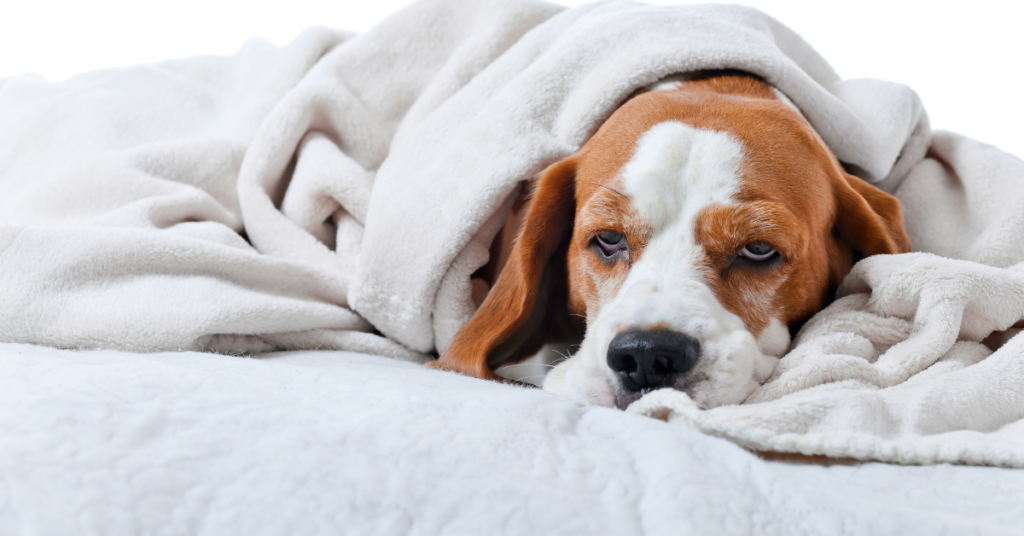
Vaccines always contain live or dead viruses in them. These dead viruses trigger the immune system of dogs to produce antibodies against a particular disease. After this, if the dog comes in contact with a real virus, the immune system can produce antibodies immediately to fight against the virus.
To experience mild side effects like fever, loss of appetite, lethargy, and temporary soreness is normal after vaccination in dogs.
These symptoms and soreness normally go away within a few hours, but contact the veterinarian if you notice it is not going away.
Some dogs may also suffer from irritation around the area where the injection gets applied. This irritation can signify some infection, so your dog needs to go for some antibiotics as prescribed by the vet.
Read Also: What Do Yorkies Usually Die From? 9 Possible Reasons.
How to Tell if the Dog is in Pain After Vaccination Shots or Not?
Dogs will never let you know they are in pain until their condition is too serious. This nature of the dogs is due to their ancestors, as, in the past, they had this nature to protect themselves from predators.
Fortunately for pet owners, there are a few signs that can help to tell if your pet is in pain or not. These symptoms include whimpering or weeping, avoiding touching the injection site, tail between the legs, etc. and this stays for sometime.
These behaviors are normal, but if they occur frequently, let your dog’s vet know about them.
What Can Be Given to Dogs to Reduce Pain After Shots?
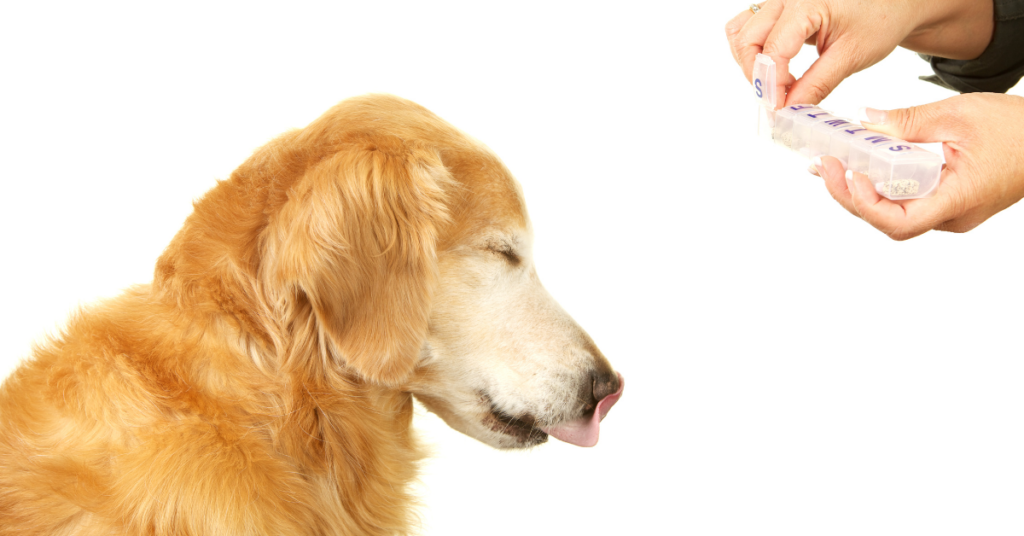
If your dog is feeling persistent pain around the area of the injection, you can treat it with common pain relief medication.
If your dog has some allergic reactions, you can use Diphenhydramine or Benadryl to provide relief to your dog. These medications mainly work by reducing swelling and soreness. 1 mg per pound of body weight is a good dose for dogs for pain relief.
There are many medicines the veterinarian can recommend to offer relief to your dog, but the preferable ones are specially formulated for dogs. Certain medicines have harmful reactions, so a vet’s advice is a must.
Certain medicines have reactions in pets by blocking prostaglandins that are used to relieve pain. But so many companies have worked to design medications that are especially for reducing pain and inflammation in pets without blocking prostaglandins or any other functions.
Until you get a proper medication prescription from your dog’s veterinarian for the medicine, you can use the buffered aspirin, but it should be temporary only.
Metacam and Loxicom are the most common NSAIDs designed for dogs. Also, the dog’s vet can advise.
- Firocoxib (commonly called Previcox)
- and carprofen (commonly called Rimadyl)
- Deracoxib (commonly called Deramaxx)
- Etodolac (commonly called EtoGesic)
These medications are designed for humans to avoid forming any clots. In addition, these medications don’t interfere with prostaglandins’ working, so no blood clot gets formed. As a result, these medications reduce the risk of stomach ulcers, blood clotting, and kidney failure in your dog that may develop due to human medications.
Aspirin can cause stomach ulcers, kidney failure, and blood clotting in dogs, so it is not recommendable for dogs having problems after vaccination.
Before you consider giving any medication to your dog after shots, it is best to consult a veterinarian. The veterinarian’s advice will help you, but don’t consider going on advice from any other person. Some dog owners may give their dogs other human medications that don’t react to them, but there is no guarantee that it will not affect your dog.
Just like humans, every pet has a different body type, and so does their body react differently to medications. Therefore, it is best to consider the veterinarian before making any decision.
What Are the Natural Anti-inflammatory Effective For Dogs After Shots?
Many traditional ways remove pain or inflammation from your dog’s body after a shot. Look down for some of the most common anti-inflammatory medications that will help your dog feel better.
Feverfew
Feverfew is a flowering plant whose leaves are dried and then used as a medication for curing pain and inflammation and is useful for dogs too. It contains many different beneficial chemicals like parthenolide that help to reduce pain in your dog.
Feverfew is a pain reliever for migraines and headaches, but it can also be used for vascular, gastrointestinal, and reproductive pains. Feverfew can cause vasodilation by relaxing muscles, resulting in lowering blood pressure.
Turmeric
Turmeric is an orange-colored medicine that comes from the ginger family. This medicine is best for treating wounds, swelling, inflammation, or pain.
Curcumin is present in turmeric, which acts as a natural antioxidant and neutralizes harmful free radicals in the body.
Turmeric is very potent, and even studies have proven that it is more powerful and useful than some anti-inflammatory drugs like aspirin.
With a safe dosage of 15 to 20 mg/kg of the dog, you can treat your dog for pain and inflammation.
CBD Oil
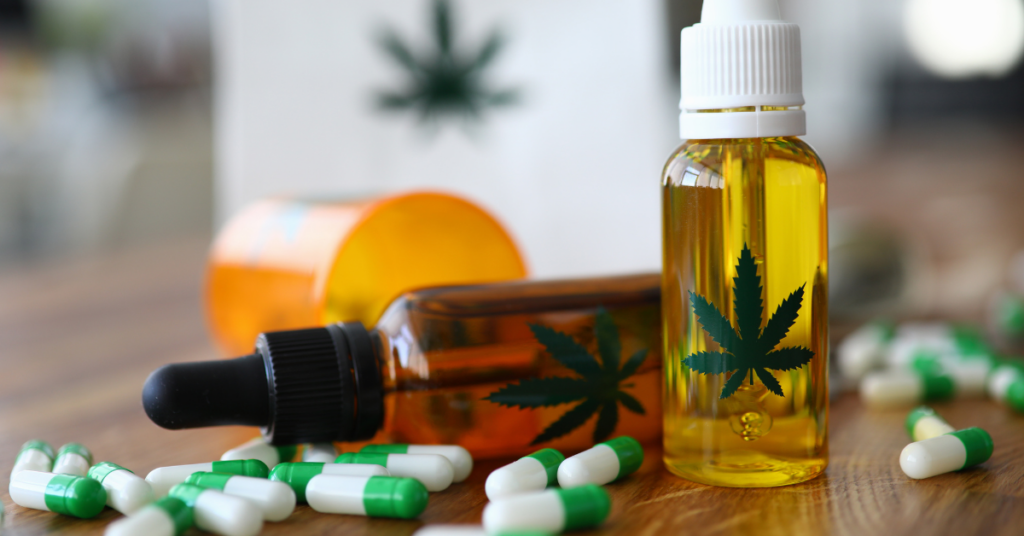
Cannabidiol is one of the eighty different chemical compounds that are present in cannabis plants. Unlike its more well-known cousin, THC, CBD is not psychoactive and does not cause a high in the consumer, nor will it cause trouble in dogs.
But instead, CBD has similar properties to many NSAIDs, which can be very useful for reducing inflammation and is safe at the same time. You can easily use this to relieve pain in your dog.
When Should I Take the Dog For Treatment?
After your dog has had shots, it is normal for the problems to occur for nearly 24 to 48 hours, but if you notice these effects and problems for more than a week, you need to contact the veterinarian. The veterinarian can examine the dog for the problem it’s facing.
If you notice that your pet dog has severe allergic reactions after shots, you must take the dog to the veterinarian immediately. But if there are no severe allergic reactions but other reactions that seem to last for more than two days, go to the vet for further assessment of your dog.
Although it is not normal, some dogs can also suffer from acute problems due to vaccination. These acute problems can result in organ failure in your dog, necessitating hospitalization and proper examination and treatment for the dog.
Is it Safe to Give Benadryl to the Dog After a Vaccination Shot?
Benadryl can be offered to dogs after vaccination as it helps reduce allergic symptoms. In addition, Benadryl can minimize the swelling and soreness of a vaccination shot in dogs.
If your dog seems to be having an allergic reaction, you can use this Benadryl for first-line treatment or immediate treatment. Your dog will be relieved if it’s having irritation, redness, hives, or other reactions after shots. As the extent of the allergic reaction remains unknown, the best option is to take the dog to the veterinarian immediately.
Its dosage can be half the weight of the dog’s body. So, for example, if your dog weighs about 20 pounds, then you can give your dog 10 mg of Benadryl for immediate relief.
What Are the Other Effective Methods for Comforting a Dog After Vaccination?
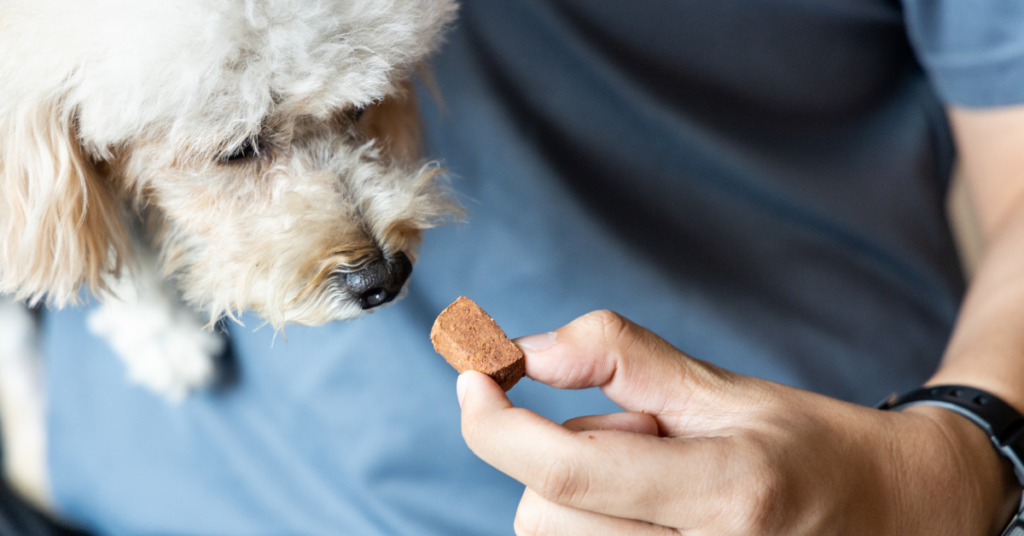
Unfortunately, dogs themselves don’t know about the importance of having shots. But after taking shots, they can be in both physical pain and mental confusion for some time. In such cases, it is better to comfort your dog by giving them warmth and making them feel comfortable.
As a dog owner, you may be familiar with dogs being sensitive when they are in pain. Of course, your dog needs attention all the time, but at the same time, during the pain after shots, your dog needs even more attention. This is not common in all the dogs.
After the shot, some dogs need a close-up place to relieve their pain. If you have a puppy of such kind, don’t disturb its sleep or resting time but keep a check on it. When your dog comes to you at a time of special attention, you can give your dog some treats or toys to play with and forget the pain for a while.
If the area where the injection gets applied gets swollen, ensure the application of a hot compress on the area for 15 minutes nearly every 8 hours.
Also, check your dog’s temperature, and if you notice that the temperature falls outside the normal temperature range after the vaccination, you should contact a vet immediately.
Also, measure the normal functions. If all the other organs or parts of your dog work well, then good; otherwise, a visit to the vet is a must.
Final Words
Getting a shot is very important for your dog, but the dog doesn’t know about it. After the shot, the dog will normally have some pain, and, in some cases, mild or severe medical allergic reactions will also be present after vaccination.
You should always ensure that you give your dog all the necessities required, and also, if any problem occurs after medication, a vet visit will be a must too. Instead of having medications, other natural methods are available to help your dog be relieved from the pain after having a vaccination shot.
Meet Madison Phillips, your compassionate guide to pet well-being. With experience from VCA Animal Hospitals and Laxton Vet Clinics Bellaire Inc. Madison honed her skills and embraced the balance of medical expertise and compassion, through her articles, she simplifies pet care, whether you’re a newbie or an experienced pet parent.

